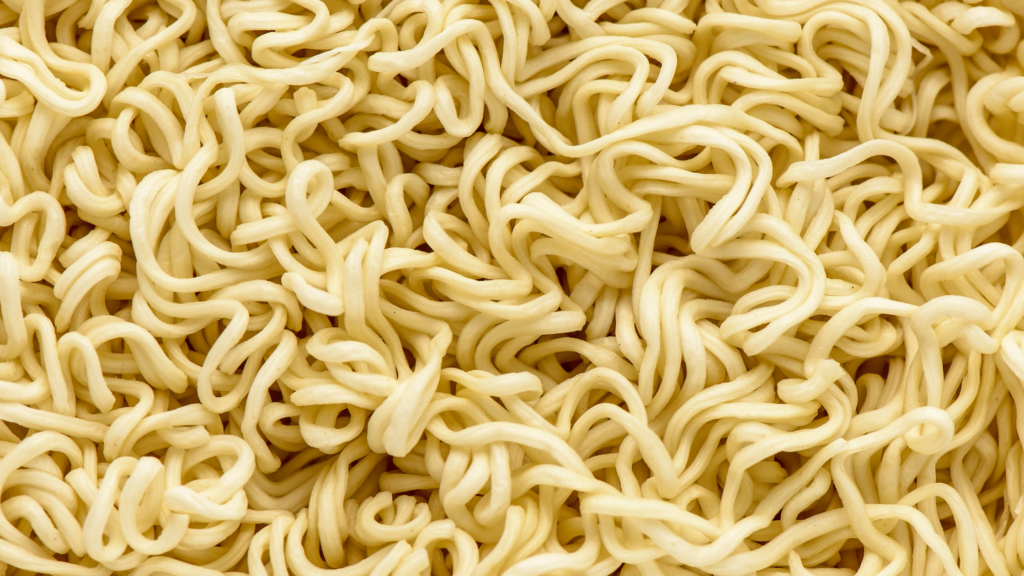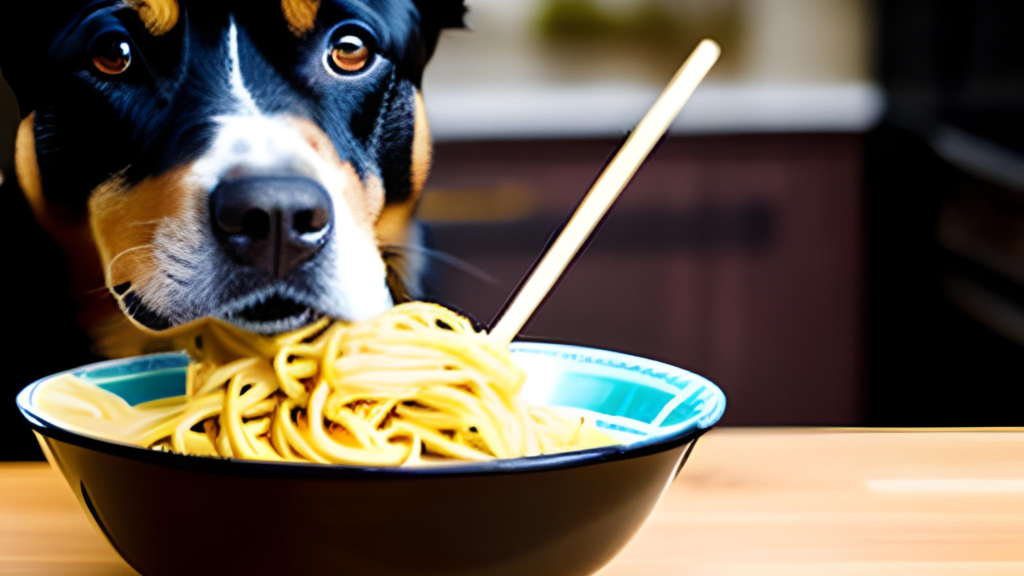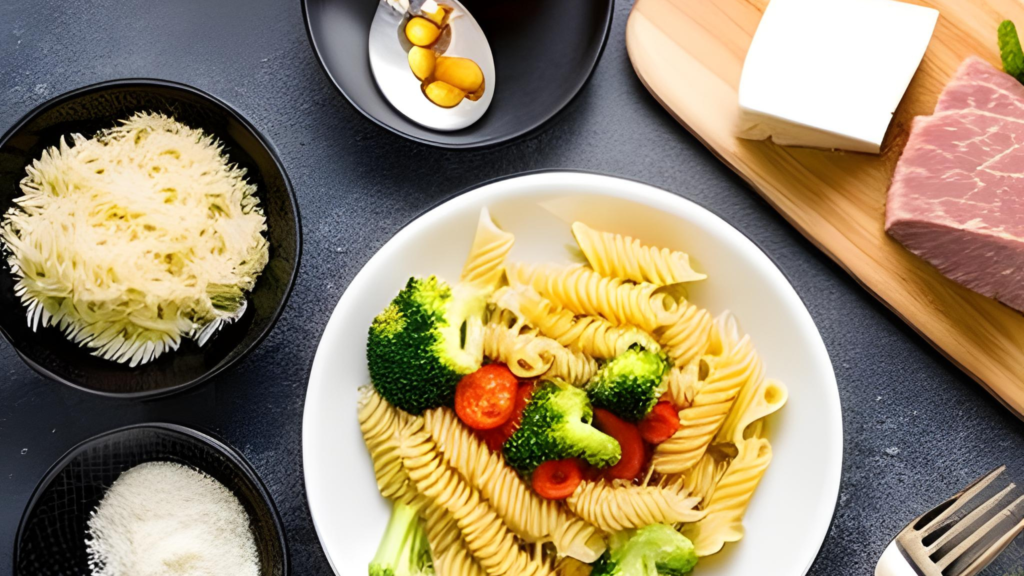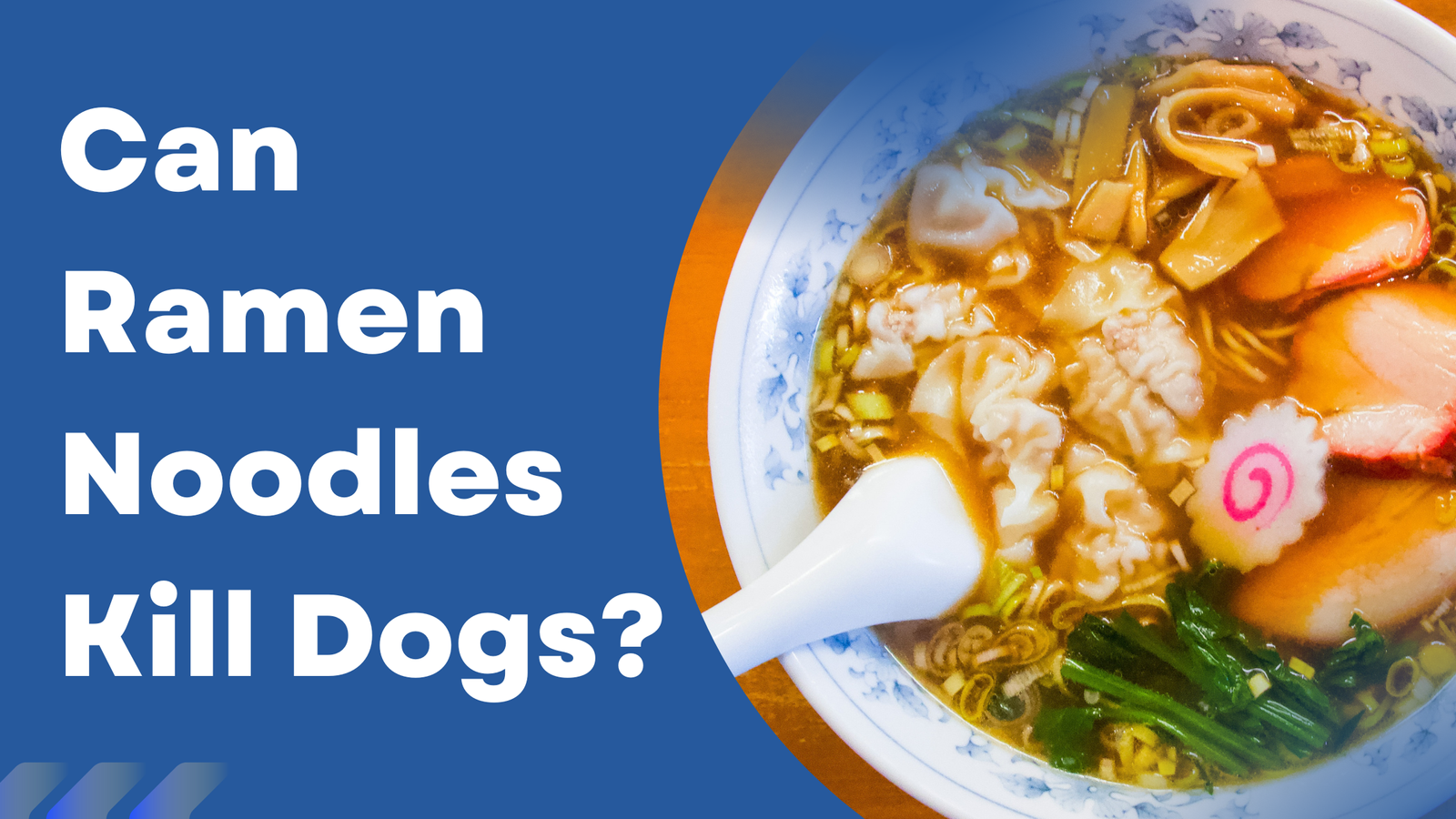Can Ramen Noodles Kill Dogs?
Ramen noodles are famous among college students and busy individuals who need a quick meal. While they may be a cheap and convenient option for humans, pet owners may wonder if these instant noodles can harm or even kill their furry friends. In this article, we will explore the question, “Can ramen noodles kill dogs?” and provide you with important information you need to know to keep your pets safe.
What are ramen noodles and their ingredients?
Ramen noodles are a type of thin, wheat-based noodle that originated in Japan. They are a staple food in many Asian countries. They have gained popularity worldwide due to their convenience, affordability, and versatility.
The essential ingredients of ramen noodles include wheat flour, salt, water, and kansui, a type of alkaline mineral water that gives the noodles a distinct texture and flavor. Some manufacturers may also add other ingredients to enhance the taste or appearance of the noodles, such as egg white powder or food coloring.
While ramen noodles are generally safe for human consumption when prepared according to package instructions, it is essential to note that they may contain high levels of sodium and unhealthy additives, such as monosodium glutamate (MSG). As for dogs, consuming large quantities of ramen noodles could harm their health and well-being.
Can dogs eat ramen noodles?

While ramen noodles are not toxic to dogs, they are not recommended for consumption. Ramen noodles are high in sodium and carbohydrates, which can harm a dog’s health if consumed in large amounts.
Dogs have different nutritional requirements than humans. A diet high in carbohydrates and sodium can lead to various health problems, such as obesity, dehydration, and heart disease. Additionally, the flavorings and spices used in ramen noodles, such as garlic and onion powder, can harm dogs in large amounts.
It’s best to avoid feeding ramen noodles to your dog and stick to a well-balanced diet formulated specifically for their nutritional needs. If you suspect your dog has consumed ramen noodles or other human food, monitor them for any signs of gastrointestinal distress or other symptoms and consult your veterinarian if necessary.
Also Read: The Akita Samoyed Mix: Crossbreed with Endearing Qualities
Why are ramen noodles not recommended for dogs?
Ramen noodles are not recommended for dogs because they lack the essential nutrients required for their diet. While they may seem like a quick and easy meal option, they are not a balanced diet for dogs.
Additionally, ramen noodles are high in sodium, leading to dehydration and other health issues in dogs. Consuming high sodium levels can also lead to salt poisoning, which can be fatal for dogs.
Furthermore, ramen noodles often contain preservatives and additives that can harm dogs. For example, some ramen noodles contain MSG (monosodium glutamate), which can cause adverse reactions in dogs, including vomiting and diarrhea.
Lastly, ramen noodles are also high in carbohydrates, which can cause weight gain and other health issues in dogs, especially if they consume them frequently or in large quantities.
Therefore, it’s best to avoid feeding ramen noodles to dogs and opt for a balanced and nutrient-rich diet that meets their specific dietary needs.
What are the potential dangers of feeding ramen noodles to dogs?
Feeding ramen noodles to dogs can pose several potential dangers, including:
- High sodium content: Ramen noodles are typically high in sodium, which can lead to dehydration, vomiting, and diarrhea in dogs. Excessive consumption of sodium can also cause more severe health problems, such as high blood pressure and kidney damage.
- Flavor enhancers: Many ramen noodle brands contain flavor enhancers, such as monosodium glutamate (MSG), which can be toxic to dogs. Consuming these ingredients can lead to various health issues, including digestive problems, seizures, and even death.
- Lack of nutrients: Ramen noodles do not contain the essential nutrients that dogs need to maintain good health. Feeding dogs a diet high in ramen noodles can lead to malnutrition, which can cause a host of health problems, including weakened immune systems, stunted growth, and even death.
- Potential for blockages: The high starch content in ramen noodles can cause digestive blockages in dogs, mainly if fed in large amounts. This can lead to vomiting, diarrhea, and other digestive issues that can be dangerous or even life-threatening if left untreated.
- Unhealthy additives: Many ramen noodle brands contain harmful additives, such as preservatives and artificial flavors, which can harm dogs. These additives can cause various health issues, including allergies, digestive problems, and cancer.
In summary, while ramen noodles may be a convenient and tasty meal for humans, they are not recommended for dogs due to the potential health risks associated with their consumption.
Symptoms of ramen noodle ingestion in dogs

It is not recommended to feed ramen noodles or any other human food to dogs as their digestive system differs from ours, and specific ingredients and spices can harm them.
If your dog has ingested ramen noodles, the symptoms may vary depending on the amount consumed, size, and health condition. Some possible signs of ramen noodle ingestion in dogs may include the following:
- Upset stomach: Your dog may vomit, have diarrhea or constipation, or experience abdominal pain.
- Dehydration: Ramen noodles are high in sodium, which can lead to dehydration in dogs.
- Lethargy: Your dog may be tired and have a lack of energy.
- Restlessness: Your dog may show signs of restlessness or agitation.
- Loss of appetite: Your dog may want to avoid eating or drinking.
- Increased thirst: Your dog may drink more water than usual.
Suppose you suspect your dog has ingested ramen noodles or any other human food and is showing any of these symptoms. In that case, it is essential to contact your veterinarian immediately.
What to do if your dog eats ramen noodles
If your dog has eaten ramen noodles, monitoring them closely for any signs of discomfort or illness is essential. Here are some steps you can take:
- Call your veterinarian: Contact your veterinarian and let them know what your dog has eaten and how much. They can advise you on the next steps based on your dog’s size and health condition.
- Observe your dog: Watch your dog closely for any symptoms of illness or discomfort, such as vomiting, diarrhea, or lethargy. If you notice any of these symptoms, contact your veterinarian right away.
- Provide water: Make sure your dog has access to plenty of fresh water to prevent dehydration.
- Don’t induce vomiting: Do not try to induce vomiting in your dog without consulting your veterinarian. Some ingredients in ramen noodles can harm dogs, and inducing vomiting could cause more harm.
- Monitor your dog’s behavior: Keep an eye on your dog’s behavior for the next few days. If you notice any unusual symptoms or behaviors, contact your veterinarian immediately.
Remember, it is always best to keep human food away from pets as their digestive systems differ from ours, and specific ingredients and spices can harm them.
Safe and healthy alternatives to ramen noodles for dogs

It’s important to note that dogs have different nutritional needs than humans. Their diet should consist mainly of high-quality dog food that is nutritionally balanced and appropriate for their age, size, and activity level. However, there are some safe and healthy alternatives to ramen noodles that you can give your dog as a treat or supplement to their regular diet:
- Cooked plain pasta: You can give your dog cooked simple pasta such as whole wheat pasta, rice noodles, or even spaghetti as a treat. Just cook it without any spices, oil, or sauces.
- Cooked lean meats: Cooked lean meats such as chicken, turkey, or beef (without any bones, fat, or seasoning) can be a healthy dog treat.
- Steamed vegetables: Vegetables such as green beans, carrots, and peas can be a healthy snack for dogs, but make sure to simmer or cook them until they are soft and easy to digest.
- Plain cooked rice: Plain cooked rice (white or brown) can be a healthy addition to your dog’s diet, especially if they have an upset stomach or diarrhea.
- Commercial dog treats: You can also give your dog commercial dog treats specifically designed for their nutritional needs. Look for treats that are low in calories and made with natural ingredients.
Always give treats in moderation and consult your veterinarian before changing your dog’s diet.
Also Read: The Border Collie Samoyed Mix: A Guide to This Playful and Intelligent Crossbreed
Conclusion: Can ramen noodles kill dogs? The takeaway message for pet owners
While a small amount of ramen noodles may not necessarily kill a dog, they are not a safe or healthy food option for dogs. Ramen noodles are high in sodium and can cause digestive issues and dehydration in dogs. In addition, some ingredients in ramen noodles, such as onion and garlic, can be toxic to dogs.
The takeaway message for pet owners is to always feed their dogs a nutritionally balanced diet that is appropriate for their age, size, and activity level. Human food, including ramen noodles, should only be given to dogs in moderation after consulting with a veterinarian. If you suspect your dog has ingested ramen noodles or any other human food and is showing signs of illness or discomfort, contact your veterinarian immediately. The best way to keep your dog healthy and happy is by providing them with a balanced diet, regular exercise, and proper veterinary care.
